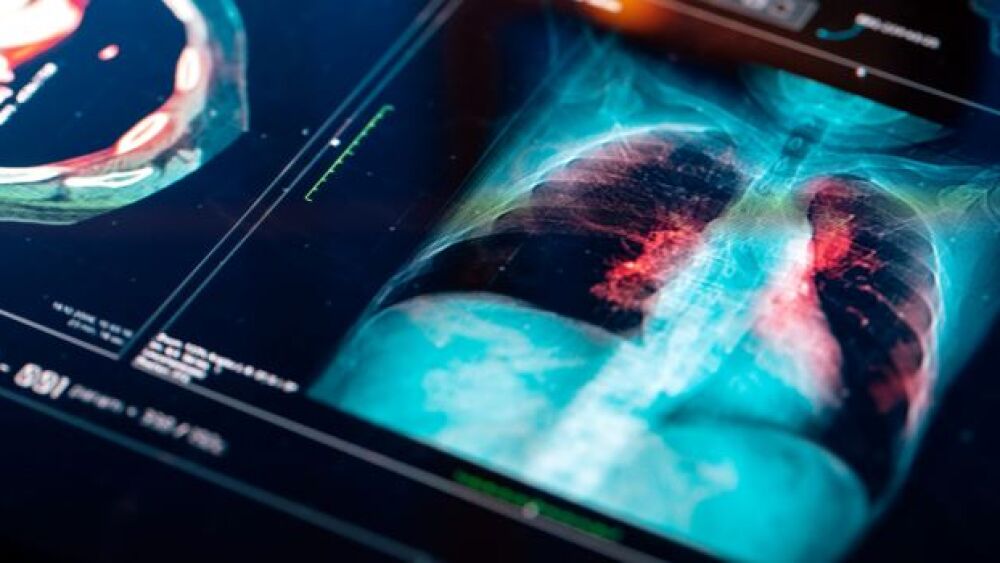AstraZeneca and Daiichi Sankyo reported that their supplemental Biologics License Application (sBLA) for Enhertu was granted Priority Review by the U.S. Food and Drug Administration.
AstraZeneca and Daiichi Sankyo reported that their supplemental Biologics License Application (sBLA) for Enhertu (trastuzumab deruxtecan) was granted Priority Review by the U.S. Food and Drug Administration. The sBLA is for adults with unresectable or metastatic non-small cell lung cancer (NSCLC) whose tumors have HER2 mutations and who have had previous systemic therapy.
Enhertu is a HER2-directed antibody-drug conjugate (ADC) designed using Daiichi Sankyo’s DXd ADC technology. It is made up of a HER2 monoclonal antibody linked to topoisomerase I inhibitor payload, an exatecan derivative. It is approved in more than 40 countries for adults with unresectable or metastatic HER2-positive breast cancer and patients with two or more previous anti-HER2-based therapies. It is also approved in some countries for adults with locally advanced or metastatic HER2-positive gastric or gastroesophageal junction (GEJ) adenocarcinoma who received previous trastuzumab-based therapies.
Of the Priority Review, Susan Galbraith, executive vice president, oncology R&D for AstraZeneca, stated, “The DESTINY-Lung01 trial confirmed the HER2 mutation as an actionable biomarker in non-small cell lung cancer. If approved, Enhertu has the potential to become a new standard treatment in this patient population, offering a much-needed option for patients with HER2-mutant metastatic non-small cell lung cancer who currently have no targeted treatment options.”
The sBLA is built on data from the Destiny-Lung01 Phase II trial and the Phase I trial. Primary data from the previously treated HER2-mutations patients (cohort 2) of Destiny-Lung01 showed a confirmed objective response rate (ORR) of 54.9%. There was one complete response (1.1%) and 53.8% partial responses.
“The results of DESTINY-Lung01 showed that Enhertu is the first HER2-directed therapy to demonstrate a strong and robust tumor response in more than half of patients with previously treated HER2-mutant metastatic non-small cell lung cancer,” said Dr. Ken Takeshita, M.D., global head, R&D, Daiichi Sankyo. “Seeking approval in the U.S. for a third tumor type in three years further demonstrates the significant potential of Enhertu in treating multiple HER2-targetable cancers.”
Lung cancer is the second most common type of cancer around the world, with more than 2 million new cases diagnosed in 2020. The prognosis for metastatic NSCLC is especially poor, with only about 8% surviving for more than five years. There are currently no HER2-directed therapies approved for HER2-mutant NSCLC, which makes up about 2-4% of non-squamous NSCLC.
NSCLC is a common target for new drug trials. This week, Black Diamond Therapeutics dosed the first patient in its Phase I trial of BDTX-1535 for both non-small cell lung cancer (NSCLC) and glioblastoma (GBM). The drug is a MasterKey inhibitor of EGFR.
Last week, Blueprint Medicines Corporation presented proof-of-concept data from the Phase I/II Symphony trial of BLU-945 for advanced EGFR-mutant non-small cell lung cancer (NSCLC). BLU-945 was designed to provide broad coverage of common activating and on-target resistant mutations, spare wild-type EGFR and other kinases to limit off-target toxicities and prevent to treat CNS metastases. Early data from the ongoing Phase I Symphony trial demonstrated dose-dependent decreases in circulating tumor DNA (EGFR variant allele fractions) and radiographic tumor reductions, including a PR in a patient who received 400 mg once a day, the highest dose tested.
Also last week, Amgen presented long-term efficacy and safety data from the CodeBreaK 100 Phase I/II trial in patients with KRAS G12C-mutated advanced NSCLC who received Lumakras (sotorasib). Lumakras is a KRASG12C inhibitor.
Lineage Cell Therapeutics also announced that Cancer Research UK had completed patient enrollment in the ongoing Phase I trial of VAC2, an allogeneic cancer vaccine, for NSCLC. And IO Biotech dosed the first patient in its Phase II trial of IO102-IO103 in combination with Merck’s Keytruda as a first-line treatment for metastatic non-small cell lung cancer. The drug targets the immunosuppressive mechanisms mediated by IDO and PD-L1.
Featured Jobs on BioSpace





